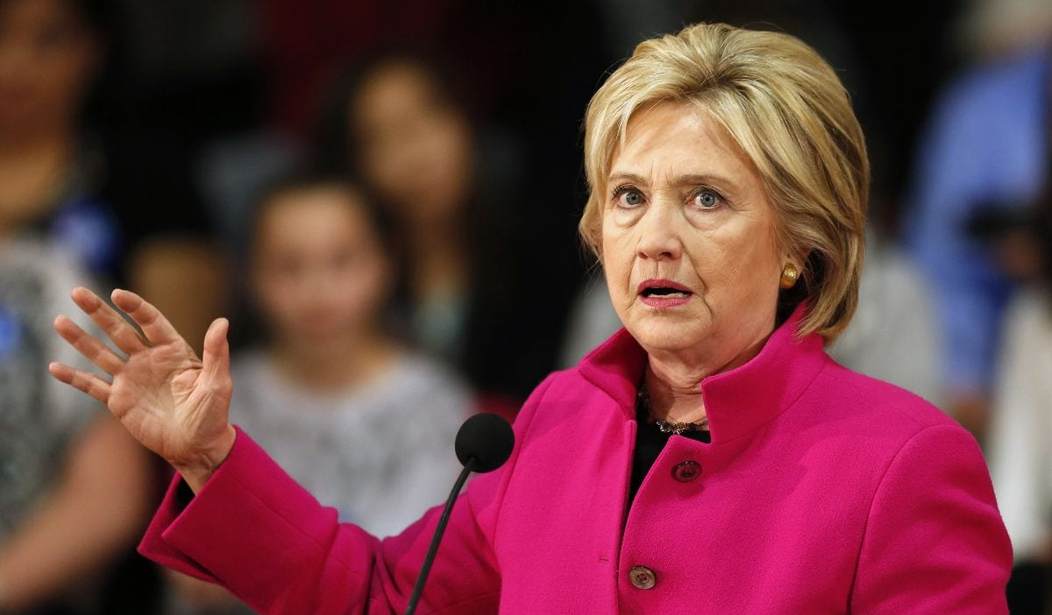Writing in the Washington Post, foreign policy analyst Robert Kagan announced that he is through with the Republican Party. He has washed his hands of them. They got what they deserve, because they have created a “Frankenstein’s monster, brought to life by the party, fed by the party and now made strong enough to destroy its maker.” As a “former Republican” he is throwing his support to Hillary Clinton for both the Democratic nomination and then the presidency. His column is undoubtedly making waves inside the Beltway.
For many years Kagan was a staple in the broad neo-conservative community. He was a contributing editor to The Weekly Standard, but now the only Kagan on their list is his brother, Frederick, who also works on foreign and defense policy at the American Enterprise Institute. Robert also was a founding member with Bill Kristol and Dan Senor of the Foreign Policy Initiative, where he remains on its Board of Directors.
The anti-interventionist paleo-conservative historian Andrew Bacevich characterized him as “the chief neo-conservative foreign policy theorist.” In 2008, the British Guardian ran a profile of Kagan, claiming that for “large sections of the left, Kagan has been blamed for many things, prominent among them being one of the intellectual authors and cheerleaders for the US-led war in Iraq.” But even then, it appears that he was having trouble being pigeonholed; the author of the piece observed that he is “uncomfortable” with the title “neocon” and “insists he is ‘liberal’ and ‘progressive’ in a distinctly American tradition.” Now Kagan has freed himself to join Hillary in the ranks of progressives who get things done.
In May of 2014, writing in the New Republic, Kagan had a cover story titled “Superpowers Don’t Get to Retire.” It was an important critique of the Obama administration’s foreign policy. In it he outlined what he called the “cracking” and perhaps “collapsing” of the old world order established at the end of World War II when American leadership predominated, helped to keep the world stable, and prevented the Soviet empire from spreading into Western Europe. He was unhappy that Obama and the American public were retreating from the belief that the United States had a “global responsibility” to stay strong and lead the world, writing that:
Unless Americans can be led back to an understanding of their enlightened self-interest, to see again how their fate is entangled with that of the world, then the prospects for a peaceful twenty-first century in which Americans and American principles can thrive will be bleak.
It was a powerful essay. After a forum where he discussed his article, I asked him if he thought it would have any influence on the president. He replied that he hoped so, but he doubted it. He was right to have that fear.
The New York Times ran a feature story about the article, noting Kagan’s hope that it might spark an “interventionist revival.” Kagan’s article was read at the White House, and soon after Obama gave a speech at West Point in which the president presented a “narrower vision for American force in world affairs.” Obama’s speech confirmed to many observers that this was the president’s rebuttal to Kagan.
The article’s author, Jason Horowitz, also noted that Kagan referred to himself as a “liberal interventionist.”
The article also gave us a hint of Kagan’s relationship with Hillary Clinton, so that it should come as no surprise that today, he would publicly endorse her for president. In 2014, he saw her as a “vessel into which many interventionists are pouring their hopes.” It also revealed that Kagan served with a group of bipartisan foreign policy intellectuals who advised her at the State Department, where his wife Victoria Nuland worked under Clinton as an assistant secretary of state. As for Clinton, he told the Times, “I feel comfortable with her on foreign policy.”
The Times immediately followed up with another article by the editor of The National Interest, Jacob Heilbrunn, a fierce opponent of neo-conservatives and interventionism. He said Kagan and Secretary of State Clinton would be a perfect fit:
Mrs. Clinton voted for the Iraq war; supported sending arms to Syrian rebels’ likened Russia’s president, Vladimir V. Putin, to Adolf Hitler; wholeheartedly backs Israel; and stresses the importance of promoting democracy.
Today, most of us do not accept Heilbrunn’s characterization of Hillary Clinton during her reign at State, but Heilbrunn sheds light on why it might be easy to “imagine Mrs. Clinton’s making room for the neocons in her administration.” That is if she still adheres to her former interventionist tendencies. If she thinks it would help her with a man like Kagan on board, it would be easier to show her critics she’s tough on national security and the use of American power.
So far the jury is still out, and Kagan stands alone among his former interventionist colleagues in pledging his allegiance to Clinton, and in completely repudiating the Republican Party. I can see that should Donald Trump get the GOP nomination, many serious conservatives, concerned about U.S. foreign policy, might then announce their support of Clinton.
What is surprising is that Kagan has not waited until we know the outcome of the GOP primary race. There could even be a brokered convention, in which the GOP will turn to someone else like Paul Ryan as a compromise between all factions. Or, perhaps, Rubio’s strong performance in the last debate will give him enough of an edge to be truly competitive.
Kagan writes as if Trump has not only won, but is just a symptom of a debased and deluded Republican Party, which was already on a death march before his arrival on the scene. The party did this through its “wild obstructionism” demonstrated by threats to close down the government; the call for “nullification of Supreme Court decisions”; the view that “compromise is betrayal”; and calls by many Republicans to overthrow their own leadership in the House and Senate. This might be true of Ted Cruz’s followers and of Republicans in the House (the famous suicide caucus), but other Republicans in the Senate did not go along with or support Cruz’s tactics. That’s why they don’t seem to like him much.
Next, Kagan argues as if there were no serious or valid arguments to limit immigration into the United States. To support it, he accuses the Republican Party of being “the well-primed gusher of popular anger, xenophobia and yes, bigotry.” In fact, there is a reasonable case to be made that many of the eleven million illegal immigrants in the country are making it more difficult for the country’s working class to get jobs such as those in Trump’s exclusive Florida resort, where native Floridians were turned down after applying for a job because Trump hired cheaper foreign labor from Eastern Europe. Kagan has a right to favor a policy of less restrictive immigration and to make a case for it, but he writes as if there is no case at all on the other side.
Next, he writes as if all Republican critiques of Obama’s policies (except his own, of course) are based on “Obama hatred,” which he calls “a racially tinged derangement syndrome that made any charge plausible and any opposition justified.” In saying this, Kagan is using an old leftist and constantly repeated trope, that the reason conservatives oppose Obama’s policies is because they are racist and against an African-American president. (That also does not explain how even in South Carolina, whites voted for a conservative African-American, Tim Scott, who is now senator from that state.)
Not only that, but Kagan argues that “many Republicans have fallen back on a mindless Islamophobia.” His Islamophobia accusation certainly can stick with the Republican frontrunner, who is demanding a temporary suspension of Muslim immigrants into America. Generally, however, the charge is used by the left to suppress anyone who is alert to the very real threat posed by radical Islamists. That is why the administration termed one attack of an Islamist who was motivated by radical Islam as a case of “workplace violence.”
Yes, too many Republicans waited too long to attack Trump, assuming he would quickly fall. It’s true that until the last debate, they fought each other and refused to take on Trump. Rick Perry did early in the campaign, and it certainly didn’t help him or Jeb Bush.
I think that if he were serious, Kagan could have waited to see whether or not Marco Rubio—who essentially has the same foreign policy perspective as Kagan—has a chance at the nomination. But he hasn’t. Should Hillary win, I actually hope Kagan is considered for a top appointment and has some influence. But he’ll have to vie with the likes of Sidney and Max Blumenthal, and the coterie of other leftists she’ll bring into her administration from Bernie’s campaign.
Moreover, he could do something like what national security professor Tom Nichols has done. He writes that he will vote for Hillary but fully recognizes the following:
I think Hillary Clinton is one of the worst human beings in American politics. She has few principles that I can discern, other than her firm conviction that she deserves the Oval Office for enabling and then defending her sexually neurotic husband. She lies as easily as the rest of us breathe. She has compromised national security through sheer laziness at best, and corrupt intent at worst. If elected, she will enrich Wall Street and raid the public coffers while preaching hateful doctrines of identity politics to distract America’s poor and working classes.
But, as Nichols puts it, as bad as Hillary is, “Trump will be worse.” Of course, there are those like Giuliani, Christie and Gingrich who have already jumped on Trump’s bandwagon. But I think Republicans and conservatives who want to save the country from Trump should take great care in deciding what they’ll do. In The New Yorker, Ryan Lizza has an interesting article about their dilemma: Bill Kristol is trying to recruit a heavyweight to run as a fourth-party candidate. (He considers Bloomberg the possible third candidate.)
Others, like Michael Gerson, a former top aide to George W. Bush, Bush administration member Peter Wehner and columnist George F. Will all present solid arguments as to why Trump is beyond the pale and why conservatives, not to speak of any voter, should not vote for Donald Trump. As Wehner writes, under Trump’s leadership, the Republican Party will have become “an angry, bigoted and populist” entity and the party of “anti-reason.”
Ryan Lizza ends his New Yorker article by quoting from the article in The Federalist written by Tom Nichols. In it, Nichols quotes Alexander Hamilton, who said he would rather lose the election of 1800 than support his rival in the Federalist Party, John Adams. “If we must have an enemy at the head of government, let it be one whom we can oppose,” Hamilton wrote, “and for whom we are not responsible.” Amen. I for one would rather have a Clinton we can fight against than a horrendous president for whom the Republican Party will be held responsible.
As for Robert Kagan, it is sad to see him on a one-man kamikaze mission to destroy the party of Lincoln and Reagan, rather than, as others are doing, trying to save it and reform it. There is a time for obituaries, but why not wait until the patient is actually dead?









Join the conversation as a VIP Member